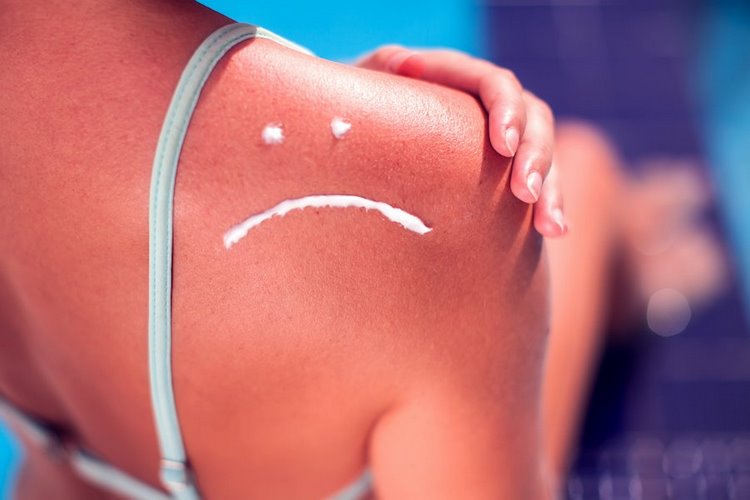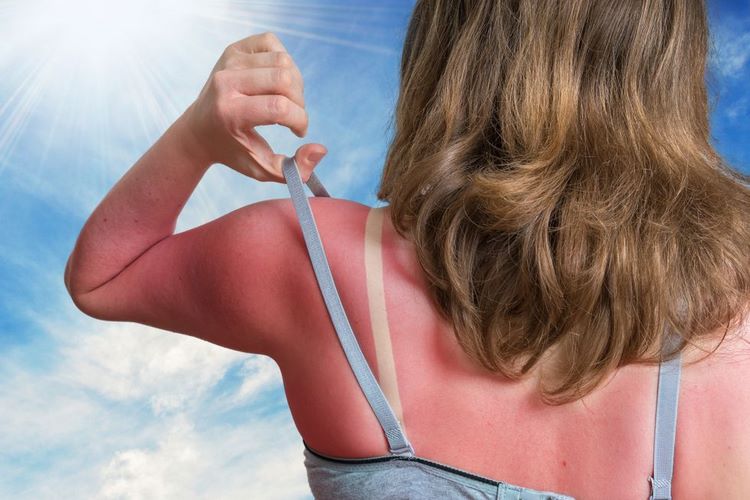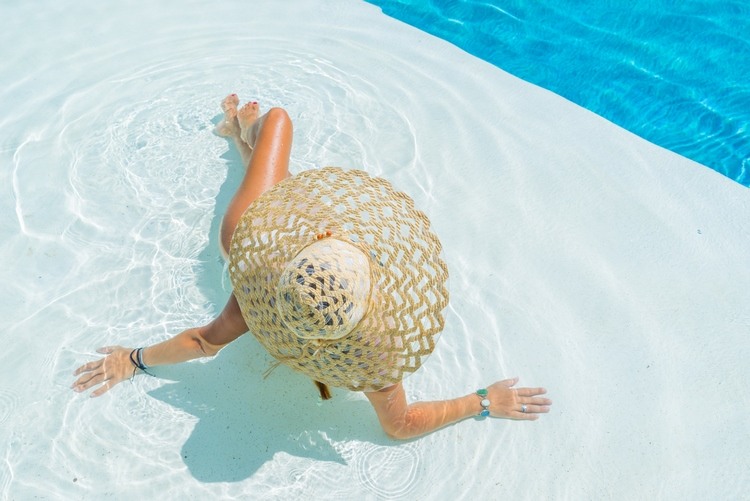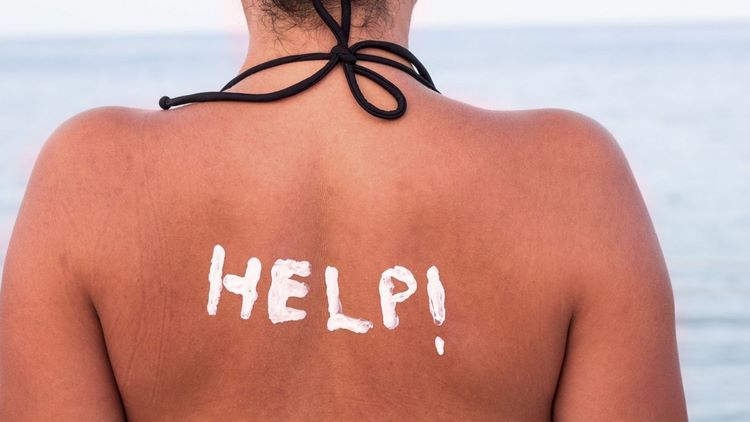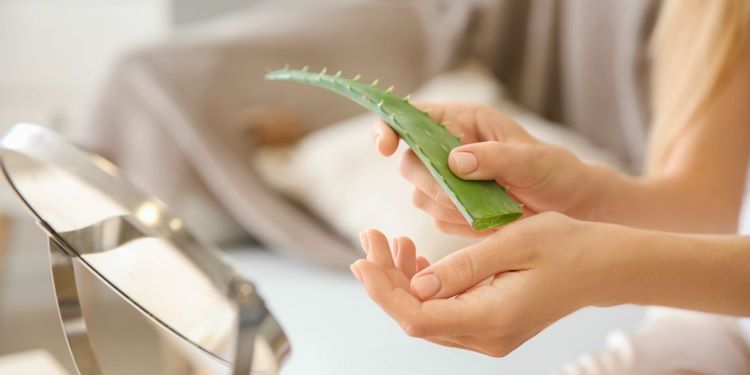With the beaches full, the pools overflowing, and the mountains with the best temperatures, we set out to enjoy the summer with enthusiasm. But, sometimes we forget that our skin is in direct contact with the sun. Sunburns are not usually perceived as dangerous, but they can be the prelude to melanoma or other types of skin cancer.
How to avoid sunburn and what to do in case you have one? Yes, summer is the season to enjoy leisure pastime with family and friends by the pool, at the beach or simply spend time outdoors. But uncontrolled exposure to ultraviolet (UV) rays, especially in the middle of the day, causes skin burns that can be severe. There are even those who do not use sunscreen, as they consider that it is for children, or for those who will sunbathe for a long time. However, there are many factors that affect the time a person can be in the sun without burning – skin color, clothing, lifestyle, work and geographical factors, such as altitude and latitude. It is common knowledge that the intensity of the sun is not the same at the Ecuador and in a country closer to the poles.
What are the Symptoms of Sunburn?
How to recognize sunburn? What are the symptoms that you should know and take immediate actions? By definition, sunburn is red, painful skin that feels hot to the touch. It appears after a long exposure to ultraviolet (UV) light from sunshine (or artificial sources). If a burn occurs as a result of exposure to the sun, the signs and symptoms will appear from one to 24 hours, except in severe cases, which may reach their maximum peak after 72 hours. Sunburn symptoms include:
- Changes in skin tone, such as pinkness or redness
- Skin that feels warm or hot to the touch
- Pain
- Swelling
- Small fluid-filled blisters, which may break
- Headache, fever, nausea and fatigue, if cases of severe sunburn
- Pain in the eyes
Why are sunburns dangerous? They increase the risk of other skin damage, such as dark spots, dry or wrinkled skin. In addition, there is a higher risk of skin cancers such as melanoma so it is highly recommended to avoid sunburn.
How to Avoid Sunburn – Simple Guidelines to Follow
Simple precautions prevent will help you avoid sunburn. It is necessary to protect yourself throughout the summer, even when you already have a tan. Here are some guidelines for you which will help you avoid sunburn.
Expose yourself to the sun gradually. You should not be exposed to the bright midday sun at the beginning of summer for more than 30 minutes. Avoid going out in the hottest part of the day – from 10 a.m. to 3 p.m.
When you buy sunscreen, make sure to check the protection factor. Experts recommend products with broad spectrum that filter both UVA and UVB rays, and with a Sun Protection Factor (SPF) of at least 30 or 50, especially in summer.
Apply sunscreen 30 minutes before you go sunbathing.
Reapply sunscreen when necessary. Many products are advertised as “resistant” but the truth is that if you are going to be exposed to the sun for more than two hours, you should reapply the sunscreen. Further to that, many sunscreens are labeled as “water resistant” and people think that they are protected even when they go in out of water. It is good to know that water resistant sunscreens provide protection for up to 40 minutes after coming into contact with water.
Wear a wide-brimmed hat and protect your eyes with sunglasses. Hats act as a sun shield not only for your face but for scalp and neck as well. Sunglasses will protect the delicate area around the eyes. Wear protective clothing like long-sleeved shirts or blouses.
Drink plenty of water and eat food rich in vitamins and antioxidants. During sun exposure we lose water and in order to avoid skin dehydration, you need to make sure you are hydrated. Fatty acids restore the skin barrier and have an anti-inflammatory effect while antioxidants neutralize the effect of free radicals, so make sure your summer diet is rich in important nutrients which will help you have healthy and strong skin.
Sit in locations with shade. Do not forget to use sunscreen on cloudy days as well. Clouds do not reduce risk of sunburn. On the contrary, it increases with high altitude.
Always use an after sun product. The market offers lotions, gels, creams, etc. They moisturize and soothe your skin and reduce inflammation after sun exposure.
How to Avoid Sunburn and What to Do If You Get Sunburn?
In general, it is not necessary to see a doctor after sunburn, as most cases are mild to moderate, but if you feel a general discomfort or if there are large blisters on the skin, it can be a potentially serious situation. If your skin has been burned, it is important to seek shelter from the sun, stay indoors and treat the burn as soon as possible. Here are simple tips for you:
- Take Aspirin or Ibuprofen. These drugs help reduce redness, inflammation and discomfort.
- Apply hydrocortisone cream to relieve pain and reduce swelling.
- Drink more water to prevent dehydration.
- Do not break blisters! They form to help the skin heal and protect you from infection, so just let them heal.
- Avoid additional sun exposure and if you need to go out, make sure that your sunburn is covered with clothing. It is recommended to wear loose clothing that doesn’t stick to your skin and allows it to breathe. Clothes made from natural fibers, such as cotton or bamboo, are best as they do not irritate sunburned skin.
- Skip the soap when taking a shower. Soap can dry out and irritate sunburned skin.
- Don’t scrub your skin! When you get out of the bath or shower, dab yourself dry with a towel, don’t rub!
- Apply a soothing, alcohol-free moisturizer with vitamin E or aloe to prevent skin dryness.
Effective Home Remedies for Sunburn to Relieve Pain and Discomfort
When you get sunburn, your main task is to relieve the pain, prevent inflammation and help the skin restore as soon as possible. Can you do that at home? Here are some Home remedies for sunburn:
Cool water
Cool water in an immediate helper. It cools down the affected, sensitive skin so applying a cool compress will help you relieve the burning sensation. You can take a cool shower or bath and pat dry the skin. Do not apply ice on the skin directly as it may cause even bigger damage. You can wrap an ice pack or a bag of frozen veggies in a towel and apply to the burn.
Cool milk
Apply cool, not cold, milk or yogurt on the sunburned skin. Milk helps ease sunburn discomfort.
Apply Cucumber Paste
Cucumbers have excellent antioxidant, soothing and pain relieving properties. Blend a chilled cucumber into a paste and apply to the sunburned areas.
Coconut Oil
Coconut Oil has is a natural sunburn remedy. It has many benefits and helps fight against skin dryness and irritation.
Aloe Vera
Aloe Vera reduces inflammation, moisturizes the skin and prevents peeling. It is one of the best remedies for sunburn. You can buy aloe vera gel or use a leaf from a plant and apply the sap directly to skin. The gel inside the plant provides an immediate, soothing relief.
Tea compress
Chamomile, black, or green tea can also soothe sunburned skin. Simply brew the tea, let it cool, soak a washcloth in it and apply it to the affected area to relieve symptoms. You can add mint to the tea for a more cooling effect
Honey
Honey is used to treat burns for millennia. It relieves pain, reduces infection and speeds up healing.
Baking soda and oatmeal bath
Add a cup of baking soda or oats to the bath. It will help ease irritation and redness from sunburn. Soaking for about 15 to 20 minutes helps minimize sun damage.
Vitamin E
Vitamin E is an antioxidant and can decrease inflammation. You can use it to rub it onto peeling skin as well.
Essential Oils
Many essential oils have soothing and calming effect. Add some lavender or chamomile essential oil to the bath to relieve the stinging and pain.

